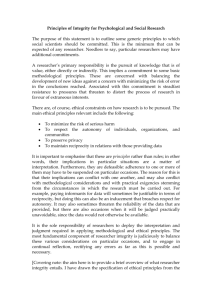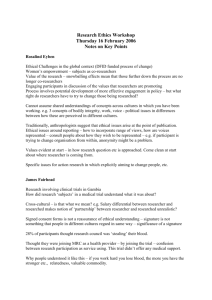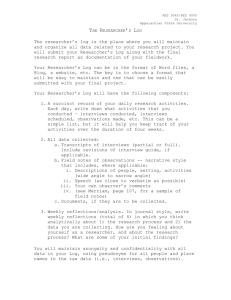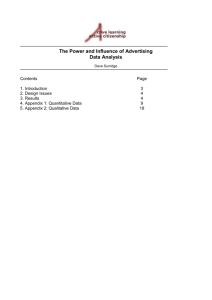Research Ethics and Power
advertisement
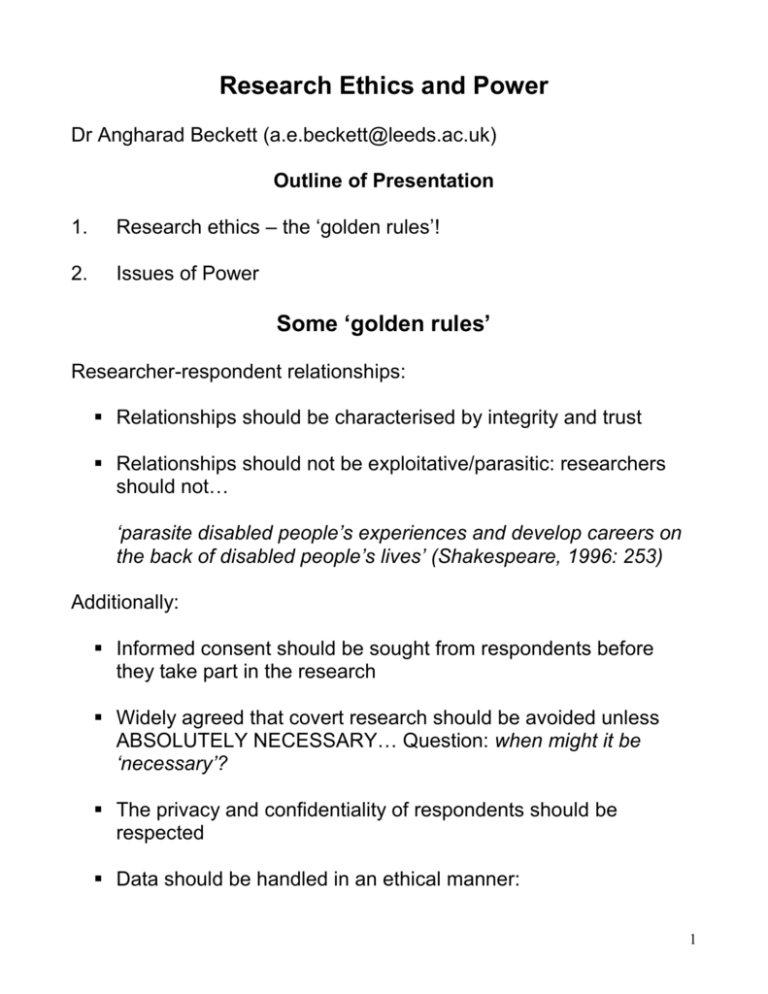
Research Ethics and Power Dr Angharad Beckett (a.e.beckett@leeds.ac.uk) Outline of Presentation 1. Research ethics – the ‘golden rules’! 2. Issues of Power Some ‘golden rules’ Researcher-respondent relationships: Relationships should be characterised by integrity and trust Relationships should not be exploitative/parasitic: researchers should not… ‘parasite disabled people’s experiences and develop careers on the back of disabled people’s lives’ (Shakespeare, 1996: 253) Additionally: Informed consent should be sought from respondents before they take part in the research Widely agreed that covert research should be avoided unless ABSOLUTELY NECESSARY… Question: when might it be ‘necessary’? The privacy and confidentiality of respondents should be respected Data should be handled in an ethical manner: 1 - in the UK, according to the 1998 Data Protection Act, for example (see www.dataprotection.gov.uk/) AND - remembering the moral right of respondents to view and review such things as transcripts and to assess whether their words and actions have been fairly represented Finally… Involvement in research should not expose respondents to HARM Researching with vulnerable or disempowered groups • Need to be careful not to assume disempowerment in all social settings, but do need to be aware that the research process might pose particular challenges or risks for respondents • Sometimes issues of informed consent may be more difficult and should be considered carefully • Practical issues should be considered – e.g. where is a safe/suitable place to conduct interviews? Is the researcher suitably qualified to undertake research with this group? Does the researcher need to have Criminal Records Bureau clearance? • What procedure will the researcher follow in the event of a respondent disclosing an experience of abuse? Will the researcher report this abuse, even if breaching confidentiality? • How do we ensure that proper feedback, appropriately presented, is provided to respondents at all stages of the research? • FINAL VERY IMPORTANT ISSUE: how can the researcher employ methods that empower vulnerable/disempowered respondents and 2 give them the opportunity to determine the important issues to be discussed? Ethical issues re. data analysis • The production of knowledge is an ethical endeavour. We need to think about the many decisions we make during analysis, including which voices we focus upon and which we ‘silence’. • We also need to be aware that reflexivity and related ethical practice involves a strong engagement with the social and political context as well as the intellectual frameworks of the research. (Issues here include the degree of ‘independence’ on the part of the researcher.) Ethical issues re. publication • How can we write up our findings in such a way as to provide a platform for the views/voices of our respondents? • Presenting ‘unflattering’ or negative findings can be a problem – this is why it is important to be honest with research respondents about the purpose of the research • Sometimes the duty of confidentiality means that important findings have to be suppressed Power and the research process… As researchers… We always need to think how to minimise power imbalances between researcher and respondent…but this is a particular issue for disability research 3 Arguably, power relations should be held under constant scrutiny and considered at all stages of the research, from research design, through data-gathering and during analysis One solution to the problem of an imbalance of power between the ‘researcher’ and ‘researched’ is to introduce the ‘equality proviso’ (Humphrey, 2000) in which everyone in the research becomes co-researcher and co-researched Undertaking disability research as a non-disabled person immediately generates a dilemma, however – the ‘equality proviso’ becomes very difficult, often impossible Does this mean that non-disabled people cannot undertake disability research? In my opinion – no it does not – but being highly reflexive about personal motivation, own identities, research and ethical practices becomes ESSENTIAL in this situation But this is a thorny issue and the jury is still out on this one… Some differing opinions… “If empowerment is to equate with an emancipatory approach, then reciprocity between researcher and researched must come to mean the exchange of like with like – women engaging in feminist research, disabled people in disability research.” (Lloyd et al, 1996: 306) “(…) logic dictates that if a researcher is to empathise with those being researched then it follows that their life history must be as near as possible to that of the people being studied…” (Barnes, 1992a: 117) “I am not convinced that it is necessary to have an impairment in order to produce good qualitative research within the emancipatory model” (Barnes, 1992a: 121) 4 Possible discussion points • What, if any, ethical dilemmas to you think that you might face in your current or future research? • Do you have any concerns about the issue of power within your current or planned research? How do you intend to approach this issue? • What, in your opinion, are the roles of the disabled researcher and the non-disabled researcher re. disability research? 5



